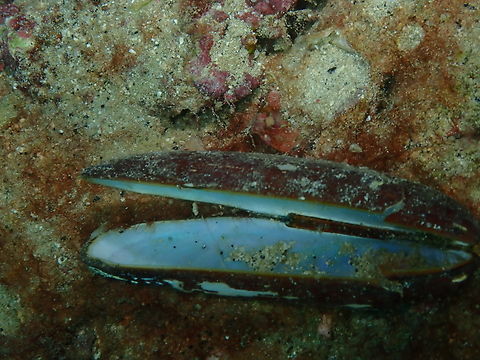
Appearance
Shells of ''Lithophaga lithophaga'' can reach a length of about 8.5 centimetres . They are yellowish or brownish, almost cylindrical, rounded at both ends. The interior is whitish iridescent purple with a pink tinge. These shells are relatively thin. The surface is nearly smooth, covered with growth lines, which sometimes can be quite rough.Right and left valve of the same specimen:
Naming
The Lithophaga lithophaga's name is derived from the Greek word ''lithos:'' meaning rock/stone and the Greek word p''haga/phago:'' meaning to eating or devouring.Distribution
This species can be found in northeast Atlantic Ocean, the Mediterranean Sea and the Red Sea. They are found on the Adriatic coast of Croatia and Montenegro under the name ''prstaci''.Behavior
These bivalves live mainly in the area battered by the waves, but they can reach depths of 125 to 200 m. They bore into marine rocks, producing a boring called ''Gastrochaenolites''. Their growth is very slow, and to reach the 5 cm length, they require 15 to 35 years. They feed on plankton, algae and debris by filtering them from the water. They reach the sexual maturity after about two years. The number of eggs that are released in a season reach about 120,000 to about 4.5 million. The fertilization takes place in the open water.Habitat
These bivalves live mainly in the area battered by the waves, but they can reach depths of 125 to 200 m. They bore into marine rocks, producing a boring called ''Gastrochaenolites''. Their growth is very slow, and to reach the 5 cm length, they require 15 to 35 years. They feed on plankton, algae and debris by filtering them from the water. They reach the sexual maturity after about two years. The number of eggs that are released in a season reach about 120,000 to about 4.5 million. The fertilization takes place in the open water.Evolution
Fossils of ''Lithophaga lithophaga'' are found in marine strata from the Miocene until the Quaternary .Cultural
Historically these shells are considered a delicacy, cooked and served in a broth of white wine, garlic and parsley.References:
Some text fragments are auto parsed from Wikipedia.